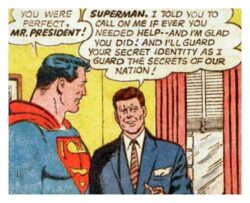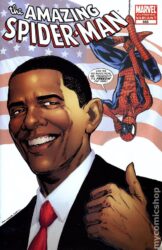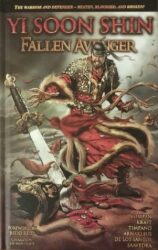I just don’t buy or read comics that focus on real-life people and events!
COMICS ARE THEIR OWN UNIVERSE TO ME
 I noticed the recent story here at MajorSpoilers.com about the Beatles getting their own comic book treatment.
I noticed the recent story here at MajorSpoilers.com about the Beatles getting their own comic book treatment.
The most important part of that article was this one: “The Beatles are the latest celebrities to get the comic book treatment at TidalWave Comics with a 96-page volume that arrives this week.”
Maybe I’m unique in this, but I don’t buy or read comics about real people. Not ones about political figures, historical people, or religious leaders.
See, to me, comics are their own alternate universe. What happens in there is just not real. I know this may come as a shock to some, but Superman isn’t real. Neither is Batman, Spider-Man, the Fantastic Four, or any other comic-book hero. Shocker, I know.
Don’t get me wrong! I enjoy comics—buying them, reading them, saving them. I just consider them a place I go when I engage my imagination. I can learn real-life lessons there and all, but when a true-to-life event is brought to the comics page, I just can’t “buy” into it.
I’m always reminded of the story Frank Miller told about how he opened a Batman comic book, and when he started to read it, he “fell in.” That’s my experience. I leave the real world behind and go to this other place where the impossible can happen because it’s in a comic book. And I truly appreciate being able to do this particularly when the real world gets tough.
There are exceptions to this rule, of course, but when I have read comics about real people, I just can’t enjoy it. It’s someone’s interpretation of that person or happening, not what “really” took place. The comics format can sometimes require changes in how stories are told just to make them happen, too.
VISITORS ARE OKAY
 With all that said, I don’t mind it when real people appear in comics… briefly.
With all that said, I don’t mind it when real people appear in comics… briefly.
A famous one took place decades ago when President John F. Kennedy talked with Superman. In my mind, that was the version of the president who existed in that alternate reality, not the “real” article.
There was a more recent “crossover” of sorts when President Barack Obama was on the cover of a Spider-Man comic. Again, my head looked at it as that universe’s president appearing with that superhero.
One thing that reinforces this perspective is when comics artists portray fictional characters who look like real-life people. For instance, I remember one book that had a man who looked suspiciously like Patrick Stewart of Star Trek fame (and it wasn’t a Trek comic, either). I’ve seen plenty of other comics people who look like others we see on the TV or in the theater.
I really don’t like that because it seems like a “cheap” way to make readers load an entire personality onto that character in an all-too-easy way. I’d rather creators actually work at world and people building and get it right!
Hey, if the Justice Society could come to the universe where the Justice League lived, I can buy there being some people we know who exist in the real world there in the comics universes.
There was a Marvel comic where President Ronald Reagan turned into a giant snake and attacked people. I understood the not-so-veiled political commentary, but again—that was the Marvel Comics universe’s version of that individual, not the real guy to me.
I understand that the Beatles comic has been in the works for years, but if I were to read it, I’d think it was the musicians in the comics universe that was being talked about or the creators’ interpretation of what happened, not the true Fab Four.
LOADED PERSPECTIVES
 As with the aforementioned appearance of a president as a villain, I particularly avoid comics about political figures. I have this desire to make up my own mind about those people, so not-so-subtle commentary about a politician, regardless of whether it comes from the left or the right, is not something I want to read.
As with the aforementioned appearance of a president as a villain, I particularly avoid comics about political figures. I have this desire to make up my own mind about those people, so not-so-subtle commentary about a politician, regardless of whether it comes from the left or the right, is not something I want to read.
I have read comics about those real-life individuals in an attempt to learn more about them. I honestly didn’t find much that I didn’t already know. I understand that it’s difficult, particularly with political leaders, to be objective when it comes to talking about them.
I can make up my own mind, thank you! I’d rather just find out more about the individual than read another “puff” or “attack” piece about that person. That has been extremely rare to find, in my experience.
Honestly, I also have this same problem with documentaries. I would rather get “Just the facts, Ma’am,” as they used to say on the old show Dragnet.
This is true of religious figures as well. My experience has been that many books about these folks have already made up their minds as to whether they are “good” or not, and they go about attempting to prove that point.
I can decide those things for myself, thank you very much!
AN EXCEPTION
 Granted, there have been a few exceptions in my comics-reading journey.
Granted, there have been a few exceptions in my comics-reading journey.
One important one is Yi Soon Shin by Onrie Kompan. I was skeptical when I first started to read this book, but I found out, though independent sources, that he had done a lot of research into this historical figure, and that was reflected in the final product.
It’s what I like in this kind of book—action and adventure as well as portraying the main character as human, full of faults and foibles as well as the ability to heroically lead his people. It was also very informative to me because I previously knew very little about that part of the world and its history! I highly recommend it!
I wish the people who made the Beatles comic much success! If I get the opportunity to read it, I will, but I will take it all in with a grain of salt!
What do you think? Do you like to read comics about real-life events or people? Are they an important source when it comes to your perspective on that person or happening? Whatever your opinions, be sure to share your thoughts below!
Dear Spoilerite,
At Major Spoilers, we strive to create original content that you find interesting and entertaining. Producing, writing, recording, editing, and researching requires significant resources. We pay writers, podcast hosts, and other staff members who work tirelessly to provide you with insights into the comic book, gaming, and pop culture industries. Help us keep MajorSpoilers.com strong. Become a Patron (and our superhero) today.



1 Comment
I have no problem if its subject matter is old enough, so its a lot more about how it “could have happened” as opposed to just a history lesson or biography. For example Vagabond, a manga about real historical person Miyamoto Musashi is one of my favorites, but its a 16th century samurai story, which means its old enough for no one to really know how and even if everything really happened. Its setting is extremely accurate historically, but the story itself could as well be fictional, nobody knows for sure.
Anything contemporary, no thanks.
So, as with anything, there are ways to do it in interesting way.